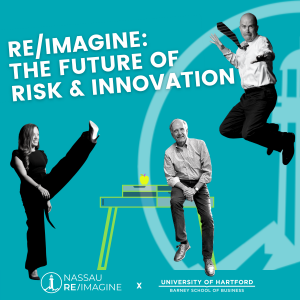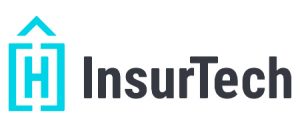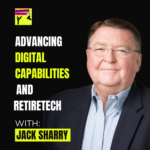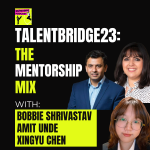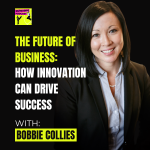In this limited series, we will explore the frontiers of risk and innovation. Join the Re/Imagine team, Barney’s faculty, graduate students, and leading thinkers in the sector to explore how technology, science, and entrepreneurship will shape risk management in the future.
The new emerging risk management environment introduces many new business practices such as “smart contracts”; the use of alternative currencies, and expedited claim processes. Blockchain, examined on its own, is emerging as an “operating system” which can facilitate many “businesses-to-business” transactions. Yet it has been almost exclusively associated with cyber currency transactions.
When properly structured and controlled, blockchain transactions offer significant enhancements to risk financing transactions which can be secure, timely, accurate, and reconcilable. So why aren’t we seeing it utilized predictably within the insurance ecosystem?
We dive into these concepts and explore associations between blockchain and the Wild West.
John Thomson, Assistant Dean, Barney School of Business, Alec Boyd, Student, University of Hartford, and Simon Kolkmann, Co-Founder & CTO, RYSKEX Inc., join us to discuss evolving trends and opportunities.
Learn more about the Barney School of Business: https://www.hartford.edu
Learn more about RYSKEX: https://ryskex.com
Learn more about Nassau Re/Imagine: imagine.nfg.com
Connect with us: https://www.linkedin.com/showcase/nassau-reimagine
Listen
Show Sponsors
This information is provided by Nassau for informational purposes only and is not meant to provide any legal, tax, or investment advice. It is not intended to advertise, market or promote third party products or services. Nassau and our sponsors do not endorse and are not responsible or liable for any third party content, advertising, products, services or other materials from such third parties. Symetra® is a registered service mark of Symetra Life Insurance Company.
‘Symetra® is a registered service mark of Symetra Life Insurance Company.’
00:00:01:08 – 00:00:12:04
Paul Tyler
Hi. This is Paul Tyler, and welcome to another podcast in a special series that we’re doing for the Reimagine podcast Laura, good to be together again.
00:00:12:16 – 00:00:31:03
Laura Dinan Haber
Yeah, absolutely. Paul. And we’re excited. You know, as you mentioned, it’s a series that we’re running here, and today’s the second conversation taking place in the Innovation and Risk Podcast series, and we’re producing it in partnership with the University of Hartford Barney School of Business. And the conversations really are created to provide insight not just into the how, but also into the why.
00:00:31:10 – 00:00:55:22
Laura Dinan Haber
So as we dig in with these partners at both that Barney School of Business and then also the, you know, showcasing startups, intellectuals, individuals, all advancing the future of finance and in some cases kind of debunking or demystifying things. And today with our conversation around blockchain, I think we’re going to be doing a lot of that. So in studio, we have with us today Simon Kauffman, co-founder and CTO of Risk X.
00:00:56:08 – 00:01:12:08
Laura Dinan Haber
We have Alexander Boyd, founder of the Q Squared Project and a student over at the Barney School of Business. And John Thompson, he’s the assistant dean career ready programs at you heart. Again, great partners in all. And we’re looking forward to the conversation today, you know, with that. Alec, why don’t you open it up?
00:01:13:14 – 00:01:33:09
Alec Boyd
Yeah. Glad to be here. Thank you guys for having me on. Yeah. I’m Alec Boyd. Going to be graduating next year from the party school of Business that you are. I’m the founder or co-founder and president of Squared Project at the University of Hartford. And I’m really interested in all things blockchain. So I’m really glad to be here today.
00:01:35:16 – 00:02:09:09
Simon Kolkmann
Yeah, maybe I’ll go on. My name is Simon. I’m looking at and I’m the CEO of Risk X, and I also co-founded the company And maybe a little bit about my background. I studied computer science, really with the focus on cryptography and I.T. security. So I have a very deep technical understanding of blockchain technology. And I co-founded Risk X, which is a a startup company, a fintech, if you will, And where we do parametric risk transfer sort of in the B2B insurance space.
00:02:09:20 – 00:02:11:05
Simon Kolkmann
B2B insurance space.
00:02:11:14 – 00:02:17:23
Paul Tyler
Excellent. John. So I’m blockchain as digital currency, right? That’s kind of how I should understand it.
00:02:18:17 – 00:02:49:00
John Thomson
Well, unfortunately, that’s sort of the view of of most of the world right now. We’ve become associated like almost one for one that blockchain and, and, and cryptocurrency or Bitcoin are one in the same thing. And yes, while blockchain does enable the transactions to be conducted via cryptocurrencies, it’s applications and it’s possibilities far exceed a direct linkage to cryptocurrencies that we know today.
00:02:49:06 – 00:03:15:15
John Thomson
And they can have a very dramatic impact on business models and how businesses are conducted and particularly focusing on how risks can be financed. And that’s really one of the angles that we are trying to explore and understand is to develop other well-known applications for blockchain. So, Alec, why don’t you open it up and throw out some of the questions that we’ve been talking about that we’d like to get clarification on?
00:03:16:14 – 00:03:29:18
Alec Boyd
Yeah. Yeah. So, Simon, my first question is going to be for you. It’s just what is blockchain? You know, what are some of the principles that this blockchain technology is based on? And why would people want this decentralized, distributed ledger?
00:03:30:05 – 00:03:58:09
Simon Kolkmann
That’s a great question. And I also like the explanation of the distinction between blockchain technology and cryptocurrencies, because blockchain, in the end is a distributed ledger or a distributed database, if you will. And every change to that database has to be validated by everyone who participates in that blockchain network. So you can see that more and more as a as an operating system.
00:03:59:03 – 00:04:27:07
Simon Kolkmann
And this operating system allows users to build applications based on that operating system. So if you hear people say that they have lost money in blockchain, what they probably mean is that they have lost money. Who was speculating on a certain asset that was implemented on the blockchain, for example, Bitcoin or Etherium? Or many of these nifty projects that you hear out there, project that.
00:04:27:08 – 00:04:51:23
Alec Boyd
You’re got it. And I guess a follow up question I would have for you, Simon, is you mentioned early on in your your description there that you could you blockchain sort of as a database. So what what would you say are some of the key differences between a traditional database that people are familiar with today and these blockchain based databases?
00:04:52:05 – 00:05:23:15
Simon Kolkmann
Oh, yeah. Generally from a from a technical perspective, they have very much in common. And the main the main difference is really that traditional databases are usually operated by central authorities. There is one I.T. guy that manages the database, and they can change whatever they like, essentially. But if on blockchain, it’s really about that Distrib fusion of power, distribution of validation tasks.
00:05:24:17 – 00:05:57:04
Simon Kolkmann
For example, if you talk about cryptocurrencies again and if someone sends coin two coins to someone else, it’s very easy to do that with a traditional database, but it can be manipulated. So what you would want is that a decentralized network or many people around the globe validate whether a transaction is correct. For example, if I send 100 coins to you, but I only own five coins, you would expect the network to reject that transaction and say You can’t do that.
00:05:58:09 – 00:06:12:04
Simon Kolkmann
So that’s that’s really my take on the on the non-technical side of the difference between the database and the blockchain. But essentially, really, the blockchain is still a database.
00:06:14:14 – 00:06:23:13
Paul Tyler
And Simon, can you give us some examples in in risk management where blockchain could or should play an important role.
00:06:24:07 – 00:06:48:04
Simon Kolkmann
Oh, yeah, definitely. And because that’s pretty much what we focus on at risk X. And the idea is really we have talked about cryptocurrencies a lot, which are essentially just, you know, there is a there’s some logic in the blockchain. There are some account balances and that blockchain keeps track who has how many coins and people can transact.
00:06:48:23 – 00:07:28:21
Simon Kolkmann
But that’s really just the currency base. So if we start talking about a little bit more complex logic than just transferring coins, then we start talking about smart contracts, which are really just pieces of software on the blockchain that can control currencies. For example, I could create a smart contract and that could be programed so that I, I don’t know, I’m going to lock in funds for one year, for example, so I can send my cryptocurrencies to that smart contract, which is programed to only release these funds after one year.
00:07:29:13 – 00:07:54:07
Simon Kolkmann
So that’s what it does. There’s no way anyone gets these coins before that year has passed. And if we increase their complexity a little bit and don’t say I want to pay out after one year, but instead I want to pay out after certain trigger has occurred, if we talk about parametric insurance for example, let’s say an earthquake risk.
00:07:54:12 – 00:08:40:04
Simon Kolkmann
Let’s talk about catastrophe bonds, for example. And they’re often, for example, in California, and we could say that if we have a an earthquake with the magnitude greater than six, that’s when the smart contract should release the funds. Obviously, that that information about the earthquake and the magnitude must get into the smart contract somehow. But it is really possible to use a smart contract or different tools on the blockchain to really replace the whole structure of cap bonds as they are out there right now in a very secure way, in a very efficient and especially cheap way.
00:08:40:09 – 00:08:41:12
Simon Kolkmann
Especially cheaply.
00:08:42:17 – 00:09:03:09
Laura Dinan Haber
So it sounds like so far there is more transparency, greater transparency, and there’s shared control. There are things such as smart contracts, all of these, in my mind, are positive. What do you think is one of the main reasons that people either resist going on and using blockchain? You know, is it fear, is it misunderstanding? Is it lack of education?
00:09:03:14 – 00:09:05:06
Laura Dinan Haber
In your opinion, why do you think that is?
00:09:06:04 – 00:09:32:07
Simon Kolkmann
Oh, a lot of that is because blockchain produces many new concepts and expects people to think different. For example, an identity in the blockchain is really just a public key. And a private key is I don’t want to explain it because it’s very cryptography based on the technical, but the overall ideas that the private key is sort of like a password.
00:09:33:04 – 00:09:57:18
Simon Kolkmann
And that password should be kept safe. And you cannot change it if you own cryptocurrencies or any kind of asset on a blockchain with your private key and it gets hacked or you lose it, you lose your password. You can never recover these funds like if you lose your banking account data, you just go there, you show your your ID and say, This is me and these are my funds.
00:09:57:18 – 00:10:21:09
Simon Kolkmann
They’ll give it to you But in the blockchain environment, if you use it, if you lose your private key to private, it’s gone. So you can hear many stories about that. People got hacked because they didn’t even know it was all about the private key or they just lost it. Hmm. And then there’s obviously that was pretty much the retail side and private people.
00:10:21:11 – 00:11:01:01
Simon Kolkmann
But if we start looking at how and why businesses could be using blockchain, but and it’s really the the regulatory side because blockchain is very decentralized and you could say democratic, but you could also say it’s very anarchistic. And that’s what we’ve seen over the past decade, pretty much, because everybody can do what they want and everybody can promote a certain cryptocurrency or a certain project and ask people to invest in that project by buying their cryptocurrency.
00:11:01:01 – 00:11:27:12
Simon Kolkmann
Or there are many different things that have happened that even though from a technical side has very high trust level, but the projects that were implemented on the blockchain or the projects that are out there right now really have a very low level of trust. But it’s not the technology that is flawed in that sense. It’s the people and what they do with it.
00:11:28:00 – 00:11:55:17
Simon Kolkmann
So there are many stories about fraud cases and people steal money, et cetera. And and I think that’s what people fear and they don’t really understand it oftentimes, but they read all these horror news about what’s happening and people are losing incredible amounts of money and they lose faith not in that project, but they lose faith in the technology and the technology and the government can’t win.
00:11:55:17 – 00:11:57:05
Simon Kolkmann
You have this government can’t.
00:11:57:05 – 00:12:26:12
Paul Tyler
Really do anything. Yeah. John, you’ve got such a unique background, unique perspective on this now. And, you know, some as you know, is out, every one of these insurance sector are so unique and specific. You know, now we you know, John, you know what we like issue policy is life insurance or annuities are a bunch of checks we make, you know, related fraud, identity you know, I can think of a couple applications like that.
00:12:26:12 – 00:13:07:18
Paul Tyler
Could have been blockchain. But I’m wondering, you know, we have groups that do it today, but putting your regulator or psychology start up. So let’s take one problem. Prescription drugs, we have a database law applies for life insurance. I file with company. She says she’s in wonderful health, never had any problems. We had a prescription database where, you know, Simon, you probably know all these drug companies, all the prescriptions get loaded up in the central system and we check and say, oh, gee, you are such he was not diabetic but you know, here’s insulin or some drug related to that.
00:13:08:09 – 00:13:24:01
Paul Tyler
If we didn’t have that prescription database, John, could that be a blockchain project? Or how do you think about privacy in a situation like this or rights or security? What would be well, is that a business? Would that be a business if it didn’t exist today?
00:13:25:08 – 00:14:13:09
John Thomson
Well, I to me, Paul, I see the opportunity here that while it’s it’s a it’s interesting to think about the comment that Simon made just a few minutes ago about the reasons why people fear blockchain. It’s interesting. I think that commercial businesses in the risk ecosystem, whether it be insurance companies or or intermediaries or reinsurance companies, those participants of that risk and insurance market may also fear that they the power that blockchain has because it becomes very threatening to the state of the world or the state of the business model and the risk and insurance and blockchain has the ability to create and actually it mandates much more transparency.
00:14:13:16 – 00:14:43:06
John Thomson
Yet there’s a lot of business models that are based upon and actually thrive upon the inefficiency in the marketplace today. And blockchain can I see it has some very interesting applications to the current business models of people of risk taking companies and and risk companies that are seeking to manage their risk where but that power comes in and it’s a little bit concerning because it’s very different.
00:14:43:06 – 00:15:04:03
John Thomson
It’s the transparency that they’re people can’t sort of say, no, I don’t take those prescription drugs or I don’t I don’t have those behaviors yet. Actually, now through technology, we have access to a lot more data which can actually prove or disprove those statements. And and that makes a lot of people nervous and really want to push back and say, we don’t want to use it.
00:15:04:03 – 00:15:30:12
John Thomson
But for the insurance industry, it can make it much more efficient. We can make more timely and enhanced risk decisions whether we want to accept a risk or not accept the risk or whether we want to actually place a risk and transfer that risk out. And that’s where I think that blockchain as an operating system actually can transform the industry and actually create better regulation of the industry.
00:15:30:16 – 00:15:42:22
John Thomson
But again, that’s very threatening because certain people are may not trust it, but there’s other people who basically fear it because it can it’s going to require significant change on their business models.
00:15:43:14 – 00:16:06:07
Paul Tyler
Well, yeah. And some of these queries, you know, they cost us, you know, can’t make us up $10 $15. Is this what Laura says to me, true or false? So, Simon, how do you think about privacy in a transparency? Laura said transparency great. Sometimes we don’t want transparency. We want privacy. How does that how do how does that can I go ahead, Alex.
00:16:06:15 – 00:16:27:19
Alec Boyd
Can I jump in on one of these? So I think an important distinction, too, is is you’re asking a very good question about privacy. And you mentioned earlier a typical belief with these blockchains is that they’re kind of anarchy. Right? So, like, anybody can access it, anybody can change it. But that’s not always the case. There’s there’s many different forms of blockchains.
00:16:28:03 – 00:16:48:04
Alec Boyd
So there’s private permissioned, there’s private permission lists. There’s ways to secure a blockchain. So the only participants that you want to let into the system have access to that system. So that kind of addresses the whole trust issue that that you were bringing up, as I see it. But I’d love to hear what Simon has to say about that, too.
00:16:48:04 – 00:17:26:12
Simon Kolkmann
I totally agree. And that’s a very good point, that there are many different ways to use blockchain and also to at least limit the transparency in a certain way. But for the point you made that there is that high level of transparency and trust, but also you want privacy, and this is a very important one. If we start talking about putting personal data on the blockchain, which is pretty much something that will never happen because blockchains are immutable and you can they grow, nothing is ever deleted.
00:17:26:17 – 00:17:59:12
Simon Kolkmann
That happened on the blockchain, which means that if you put personal data on it, it will never be deleted. And that violates a rights to be forgotten. That’s a right that we have. So with these types of use cases, it is very hard to, let’s say, draw the line between transparency and privacy and even if even that blockchains are very transparent and they are, you can see every single transaction.
00:18:00:08 – 00:18:16:23
Simon Kolkmann
But if you look at who has sent one Bitcoin to someone else, the identities are very, very cryptic. So you you don’t read the name. And even someone’s I.D. number or whatever it is incredibly cryptic. Try to be cryptic.
00:18:19:18 – 00:18:52:06
Paul Tyler
Well, let’s push it even further. You mentioned the word immutable, right? Yeah. One hand that’s positive. It’s it’s you already raised the right to be forgotten. Well, the same. OK, that’s interesting. How about security, right? Because, you know, you look at the encryption schemes or the math behind the algorithms today. Now, if if if we’ve created an encrypted blockchain, you know, vintage 20, 22, OK, fast forward five years.
00:18:53:02 – 00:19:03:05
Paul Tyler
We have quantum computing that can crack whatever the algorithm how secure does it stay over time if doesn’t change? You know.
00:19:03:18 – 00:19:35:05
Simon Kolkmann
That’s a how do I think about that? Yeah. And but we should generally probably make one thing clear on a blockchain, nothing is really encrypted, at least not on the on the standard one and things are secured using cryptography. But cryptography is not necessarily only about encryption, but you’re absolutely right. And if you put encrypted data on the blockchain, it’s going to stay there even after the encryption has been cracked.
00:19:35:21 – 00:20:01:19
Simon Kolkmann
So yes, if if quantum computing becomes a lot more advanced and it’s actually actually not just the fact that someone has a quantum computer, but they’re actually willing to start decrypting blockchains or tech private keys or whatever they could do, that’s definitely an issue. The data will always be encrypted and be completely transparent to everyone.
00:20:05:01 – 00:20:06:07
Laura Dinan Haber
So a topic is the right.
00:20:06:07 – 00:20:25:09
Alec Boyd
OK, go for it. No, I was just going to say, is there is there any technologies right now that could that could maybe prevent that? Or would you have to, you know, build a new blockchain technology based off of quantum computing to keep it secure against quantum computers? Or is there methods already being put in place to kind of help secure blockchains from that threat?
00:20:25:10 – 00:21:03:11
Simon Kolkmann
Yeah, the that’s the question the smartest guys and security experts ask every day, because it’s always that it’s called host quantum plus quantum computing. And you you want to make sure that you have algorithms in place that will still be secure once there are quantum computers. So some blockchains allow the cryptographic algorithms to be replaced, which means that once there is a quantum computer and the blockchain could be attacked, the algorithms could be replaced with ones that are secure.
00:21:04:21 – 00:21:26:17
Simon Kolkmann
But that’s really something that is incredibly technical, incredibly complex. And it’s also really about prediction because no one really knows what happens, what quantum computers will be capable of. But it’s definitely something that will be absolutely relevant in ten to 20 years when you get wow.
00:21:26:17 – 00:21:54:17
John Thomson
That’s pretty amazing because that that takes me to Tomorrowland, which is, which is something that, as far as I find very interesting to think about, but one of the things I see, it’s a follow up call back to the question you asked me before is, is the ability for blockchain in its current form to actually add great efficiency to the risk processes that we have, like risk transfer and risk acceptance?
00:21:54:17 – 00:22:32:12
John Thomson
And you know, I’m old enough to know that we grew up in the insurance industry thinking that the insurance premium dollar. $0.65 of that dollar were allocated to paying claims and 35% was it was allocated to paying the expenses associated with the transaction. What we’ve evolved over you know, my professional career in terms of decades is that we really can’t sustain that inefficiency that 35% expense component where of every risk dollar that’s out there or at risk unit if you will.
00:22:32:17 – 00:22:59:16
John Thomson
35% of that unit value is is is allocated to expenses. And blockchain really offers us I think the opportunity to reduce that 35% amount significantly and leave a higher percentage of that risk unit available to those who are either are accepting that risk and that’s where I think it brings great efficiency to the risk ecosystem to do that.
00:23:00:01 – 00:23:36:21
John Thomson
Now clearly there’s a lot of industry that’s evolved over 300 years in that risk and insurance ecosystem that that actually makes money with the inefficiency. But for actually objectively putting the risk out there that this risk blockchain really offers the opportunity to significantly enhance the processes with this blockchain as an operating system and bring great efficiency and improve the the amount of risk units that are actually allocated to finance seeing the event or the adverse event.
00:23:38:14 – 00:24:05:06
Simon Kolkmann
Totally. And that’s just not just for technical reasons. I’d like to make one comment about that. Because in order for you to actually put something that you could call insurance or parametric risk transfer or however you want to call it on the blockchain, you have to simplify it first because you it is not helpful to put a thousand pages insurance policy on a blockchain there’s zero efficiency gains.
00:24:05:16 – 00:24:16:07
Simon Kolkmann
But if you simplify that thing, like to the bare minimum, then Jon, you’re, you’re totally right. It’s going to excel and it’s going to reduce administration costs and structuring costs, et cetera.
00:24:17:19 – 00:24:29:01
Paul Tyler
Yeah. I think the opportunities to drive costs out mean we could offer smaller and smaller policies Jon. Right. I think it opens the door to exactly assurance in a way that we never could up until today.
00:24:30:19 – 00:25:02:09
John Thomson
I like that a concept of micro insurance or micro risk contracts. That’s a very interesting piece because I think what that does then is it opens up a lot more possibilities for risk seeding entities, entities either who own the risk today and want to move it and transfer it. They can do it on a on a faster but more laser focused basis and it makes the risk exception acceptance process on the other end of that transaction faster and quicker and more efficient.
00:25:02:09 – 00:25:23:01
John Thomson
As well. And that’s where I think that I these are the applications that I see that blockchain really brings. And that’s from my that’s my personal interest is that it really opens up a whole new way of of of facilitating these interconnections within the risk and insurance ecosystem.
00:25:24:03 – 00:25:53:22
Paul Tyler
Yeah. Now all of the following along sort of the regulatory dimension. Does regulation help or hurt the blockchain? And I could I could argue both ways. You know, we’ve seen central banks create frameworks, start to build frameworks over the last year or two of the currency. We just saw the executive order from the Biden administration. At the same time, we see Russia and China starting to throw up huge walls, almost creating separate Internets.
00:25:55:08 – 00:26:03:03
Paul Tyler
What are your thoughts? You know, regulators, friends or foe for growth of the blockchain?
00:26:04:07 – 00:26:31:08
Alec Boyd
I I would think in my opinion, they’d be friends. I mean, anything that’s more regulated is going to see more institutional adoption because these large institutions, one of their major barriers to adopting blockchain technology is I think that it’s it’s kind of like the Wild West still. There’s really no regulation in it. And until that regulation comes along, they can only kind of view from the sidelines this this innovation that’s happening.
00:26:31:17 – 00:26:33:08
Alec Boyd
So that’s that’s kind of the way I view it.
00:26:34:17 – 00:26:35:10
Simon Kolkmann
I yeah.
00:26:35:11 – 00:27:03:16
Laura Dinan Haber
I like Alex characterization of the Wild West. Yeah. I wanted to hear what Simon said because in the U.S., of course, that, that, that that that euphemism of the Wild West, we use it all the time. And and how does that translate kind of into the the EU perspective or or living on the border of this perhaps emerging ecosystem of that is that is building in in Europe of, you know, us versus them.
00:27:04:10 – 00:27:34:05
Simon Kolkmann
Yeah, we didn’t have a Wild West, so we just use yours and but we use the same analogy really. And you’re totally right. I also agree with with Alec because it is every project we need just was pure anarchy on the blockchain. And there were so many fraudulent cases and people just rip money out of innocent investors or innocent retail traders or whoever.
00:27:34:20 – 00:28:06:16
Simon Kolkmann
And I think that regulation is totally unnecessary. So that there will be business adoption. So I totally agree with what what Alex said. And, and I also think that it is so regulators tend to overregulate things, especially in Germany, in Germany. But I think that the blockchain as a whole has so many or provide so many opportunities so that even if a certain thing was overregulated, the money will just move somewhere else, somewhere else.
00:28:07:00 – 00:28:40:13
Simon Kolkmann
And so I think regulation is definitely a friend and it’s definitely necessary for business adoption. And what China and Russia are going to do with the technology is very difficult to say. I mean, China, for example, banned cryptocurrencies to to quite some extent some extent it is still possible for for Chinese people to interact with the cryptocurrencies using using virtual private networks or proxy servers or whatever.
00:28:40:13 – 00:28:49:06
Simon Kolkmann
But it’s going to be very difficult. And and I’m curious what the future is going to bring at that point, especially for Russia. For Russia.
00:28:50:15 – 00:29:10:13
Laura Dinan Haber
So staying on the team, the theme, rather, of a future, what do you think some of you know, what are some of the key roadblocks? And we’ve been talking about them along this conversation, but are there are there specific roadblocks that you want to call out that you could see, you know, standing in the way of at least, you know, adoption from a faster perspective?
00:29:11:05 – 00:29:48:19
Simon Kolkmann
Yeah, definitely. And I’d mentioned stable coins. We’ve talked about cryptocurrencies a lot. And most people associate that with Bitcoin ether, you name it. And there are thousands of them and they don’t have sort of a central bank, but it’s purely driven by supply and demand by speculators. So they’re incredibly volatile and far away from stable so there there was the idea of a stable coin, which means that there is some central exchange that issues that stable coin, which is the exact same thing as a cryptocurrency.
00:29:48:23 – 00:30:10:15
Simon Kolkmann
But they say you can give us for every dollar you give us, we issue one coin we give that one coming to you. And whenever you send us back of that coin, we’re going to give you back $1. So that’s the idea of putting Fiat money on a blockchain, to use it inside of the blockchain environment, environment and.
00:30:10:15 – 00:30:16:18
Paul Tyler
Interest. Interesting. So that almost it it takes care of the who’s the central bank issue.
00:30:17:02 – 00:30:39:02
Simon Kolkmann
Yeah, totally. Yeah. I mean, there are still some central authority there that has to manage and issue that currency but there are ways to make that in a distributed way or a decentralized way so that you can actually have a stable asset that you can transact in on the blockchain. And while that’s technically possible already, it still works.
00:30:39:02 – 00:31:10:15
Simon Kolkmann
People transact using USD, for example, which is the U.S. dollar token on the blockchain, or there’s USD from the Gemini Exchange, which was founded by the Winklevoss twins and so there are many of these stable coins out there, but they still lack regulatory approval. So technically that works. But businesses are still very careful to just use some unregulated exchange, put millions of dollars into their custody.
00:31:10:15 – 00:31:27:15
Simon Kolkmann
And just to use that token but I think that’s going to and we will see widespread adoption of a handful of stable coins in the very near future. And I think regulators are already focusing on them well.
00:31:27:23 – 00:31:52:05
John Thomson
That go ahead is pretty amazing to me for me to hear. I mean, Paul, I mean just think about what that does in terms of if we have a stable token or coin which can be used on blockchain, that seems to me to really, you know, to relieve a lot of the questions in this, in the stability and the concerns about using blockchain as an operating system.
00:31:52:05 – 00:32:23:11
John Thomson
If if we can have transactions that are conducted with a stable coin and then we can deal with the second issue in terms of coming up with sort of the simplified contracts, you know, that are associated with the transactions which actually Paul gets to your point about micro contracts that it enables and opens up a whole new world of possibilities with respect to the the risk business that we have in terms of the the transfer and acceptance of risk.
00:32:23:11 – 00:32:38:05
John Thomson
And using this new enhanced operating system versus relying on something that supported an industry that’s 350 years old, it’s kind of it’s really a fast forward movement from my perspective.
00:32:39:15 – 00:32:55:17
Paul Tyler
Oh, it absolutely is now. And time goes fast. We’re at the end of our schedule time, but what a great discussion. I mean, John, what are your you know, what are your takeaways or thoughts you’d want to leave with your audience?
00:32:56:08 – 00:33:25:03
John Thomson
Well, to me, I think as hopefully we can start together by having conversations and dialogs like this is understand that the the concepts of of blockchain and that demystifying it and understanding its power as a as an operating system and Simon, I love the fact that you you gave gave me that new label to use in my thinking and in my conversations to help people understand what it is.
00:33:25:03 – 00:33:50:23
John Thomson
It’s an operating system. But I think that thing that has the opportunity now is to really address the the applications of blockchain and start to build that out, whether it’s in the risk financing or the risk and insurance ecosystem or whether it’s in health care or whether it’s in manufacturing, you know, where you have advanced manufacturing, which assembles components that come from many different places.
00:33:51:13 – 00:34:17:19
John Thomson
Or if you’re looking at transferring you know, life and health risks, it really helps us create sort of the future for conducting the transactions and and doing it in an efficient and effective way and in a way that’s that’s trusted. And people can be confident and not sort of say, I have to leave a margin on the table for perhaps the information not being correct or being true or whatever.
00:34:17:19 – 00:34:43:07
Laura Dinan Haber
You can actually eliminate that portion in the risk financing process and make this risk and world operate in a sort of this fintech and insurtech and new world in a time, and I would be sorry to part, I would be remiss in not asking the question, you know, what is your why here? Why did you get into this and what do you hope for for future?
00:34:44:20 – 00:35:18:16
Simon Kolkmann
I got into this because I’m I’m fascinated by the technology. It is just as John said, the opportunities are incredible for the whole world and not just from a financial perspective. I mean, everything on the blockchain right now is very much financial focused. But I think there’s going to be a lot more use cases. I think there are a lot of opportunities to not just put our business cases on the blockchain and simplify them, but also come up with completely new ways of thinking.
00:35:18:16 – 00:35:35:08
Simon Kolkmann
And I love how creative you can be and with the technology. And every every week I have something that I’ve read about and I think I didn’t know you could do that. So that fascinates and has never stopped since I started learning about it.
00:35:37:04 – 00:35:41:08
Laura Dinan Haber
And Alec, why as a student, how did you get interested and what are you looking forward to?
00:35:42:13 – 00:36:18:02
Alec Boyd
You know, it’s very similar to assignments. I’m extremely interested in the technology. I’ve been fascinated by some of these applications and something in particular that Simon mentioned about how down the line there’s going to be applications that nobody’s even thought of yet. An example I like to use for that is in the early 2000s, you know, late 99, when the Internet was just coming around and was was gaining popularity, nobody would have ever thought that, you know, 15 years, 14 years down the line when Uber comes around, that the Internet has now totally revolutionized the taxi industry.
00:36:18:09 – 00:36:41:11
Alec Boyd
Nobody at that time, in the early 2000s would have thought something like that could happen. And I kind of see us being at the same point right now with blockchain where ten, 15 years down the line from now, there’s going to be applications that, that nobody’s even thought of yet. And it’s that kind of excitement that’s that wants me to be involved in this space because there’s, there’s so many opportunities to build cool products yeah.
00:36:41:12 – 00:36:45:13
Paul Tyler
OK, Laura, your turn. What was your biggest aha. During this discussion?
00:36:46:04 – 00:37:06:09
Laura Dinan Haber
You know, I’ve had several been taking notes the entire time. I would say it’s it’s the Wild West anarchy element. You know, that struck me as interesting. I know that I’m going to be reading more and we’ll be linking to some resources in the show notes. So listeners can do the same, but really getting a better understanding and in a clearer way to explain to people what blockchain is.
00:37:06:09 – 00:37:09:22
Laura Dinan Haber
So for me, those were the two biggest takeaways. Paul, how about yourself?
00:37:10:17 – 00:37:38:08
Paul Tyler
Are the layers, right? The layers involved in driving some of the technology through society and who knows how it will impact us? But I’m with you. I think it’ll be an I think we’ll be shocked not ten years from now, but five years from now. How it’s changed our change our world. So people want to find out more about your company, more about the work you’re doing, what’s where’s the best place to to go.
00:37:39:16 – 00:37:54:07
Simon Kolkmann
And definitely risk scum. And maybe even if there are any questions from the audience or from you, I am on LinkedIn, so feel free to connect and ask questions. Feel free to reach out to me.
00:37:54:16 – 00:38:01:10
Paul Tyler
OK, excellent. All right. Listen, thank you, everybody. And we want to thank our listeners and join us next time.
00:38:04:12 – 00:38:07:00
Laura Dinan Haber
Great. Thank you, Paul.
00:38:07:22 – 00:38:08:11
Alec Boyd
Thanks, guys.
 NASSAU RE/IMAGINE
NASSAU RE/IMAGINE